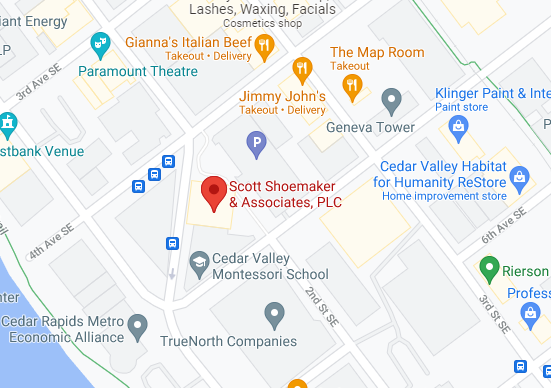Making Your Healthcare Decisions Known in Advance
Planning for unexpected medical situations is one of the most responsible and compassionate ways to protect yourself and your loved ones. In Iowa, an Advance Directive for Healthcare allows you to express your medical treatment preferences and appoint a person you trust to make decisions on your behalf if you are incapacitated. At Scott Shoemaker & Associates, we help Iowans create legally sound, personalized Advance Directives that reflect their wishes.
What Is an Advance Directive?
An Advance Directive is a legal document that communicates your healthcare wishes in the event you’re unable to speak for yourself. These documents include:
- Living Will: Outlines specific medical treatments you do or do not want to be administered if terminally ill or in a persistent vegetative state.
- Durable Power of Attorney for Healthcare: Appoints someone you trust to make medical decisions on your behalf if you are incapacitated.
- Do Not Resuscitate (DNR) Order: A physician-signed document stating that you do not wish to receive CPR or advanced cardiac life support if your heart stops or if you stop breathing. This may be a wish for those who have fatal illnesses or have reached the end of life.
- POLST (Physician Orders for Life-Sustaining Treatment): This medical order form used in Iowa outlines your preferences for emergency medical treatment. It can be vital for people with serious health conditions. A POLST is filled out in consultation with your doctor.
The Importance of Having an Advance Directive in Iowa
In Iowa, not having an Advance Directive means critical medical decisions could fall to physicians or default to next-of-kin under stressful and uncertain circumstances without guidance regarding what you would have wished. According to Iowa Code §144A (the Life-Sustaining Procedures Act) and §144B (the Durable Power of Attorney for Health Care Act), advance directives are recognized as legal tools that empower Iowans to make their healthcare wishes known and respected. Having an Advance Directive in place offers a range of protections, including the following:
Protects Your Voice and Autonomy
Iowa law gives legal weight to your written healthcare choices. A properly executed directive ensures local hospitals and healthcare professionals follow your instructions even when you are unconscious or incapacitated.
Prevents Emotional Burdens on Family
Without a directive, your loved ones may be forced to make gut-wrenching decisions in a crisis. Advance directives remove the guesswork by clearly stating your preferences and spare your loved ones from making these choices for you.
Reduces Legal and Ethical Disputes
Healthcare providers in Iowa must honor valid advance directives, which help prevent family conflicts, a delay in treatment, or medical interventions you do not want. This is especially important in Iowa, where end-of-life decisions could involve multiple providers in various medical facilities and locations.
Aligns With Iowa’s Health Systems
Many of Iowa’s major medical centers, including the University of Iowa Hospitals and Clinics and MercyOne, encourage patients to complete advance directive forms at medical appointments or when being admitted to a hospital.
Provides Clarity in Emergency Situations
Iowa’s first responders and ER staff can act more swiftly and appropriately when a directive or POLST form is available, particularly in cases involving CPR or life support.
What is the Difference Between a Living Will and a Power of Attorney for Healthcare?
Many clients visiting Scott Shoemaker & Associates have questions on the use and difference between types of advance directives. It is recommended that most people have both of the following, as they serve different but complementary purposes:
Living Will
This document only applies in end-of-life situations, such as a coma or a terminal illness, and addresses specific medical treatments you do or do not want. For example:
- Whether you want to be placed on a ventilator
- Whether you want feeding tubes or other artificially administered nutrition
- Whether to use CPR or other life-prolonging measures
It does not authorize someone to decide for you; it just outlines your wishes for doctors to follow.
Durable Power of Attorney for Healthcare
This document names a trusted person (your agent) to make medical decisions should you be unable to communicate at the end of life or if you are seriously injured or ill. Your agent can:
- Speak with your doctors and review your medical records
- Consent to or refuse treatments
- Move you to a different facility if needed
- Make ongoing decisions based on changing medical conditions
It gives flexibility to someone you trust to carry out your wishes, whether temporarily unconscious or facing long-term illness.
Who Should You Choose as Your Healthcare Agent?
Choosing your healthcare agent is a profoundly personal decision. They should be:
- Trustworthy and responsible: Someone who will follow your instructions, even under pressure.
- Available and willing: They should be willing to accept the role and be reachable in emergencies.
- Knowledgeable about your wishes: They must understand your healthcare preferences and values in detail.
It is also recommended that you name a backup agent in case your primary choice cannot serve.
How to Make an Advance Directive in Iowa
To be legally valid under Iowa Code §144B.3, an Advance Directive must be:
- In writing: Oral instructions are not legally binding.
- Signed by the declarant: You must sign the document while of sound mind.
- Properly witnessed or notarized: Either notarized or signed by two adult witnesses who are not your healthcare agent or relatives.
Working with an Iowa estate planning attorney ensures your documents are complete, compliant, and clear.
When Does an Advance Directive Take Effect?
An Advance Directive becomes effective only when a physician certifies in writing that you are no longer capable of making your own healthcare decisions. Until that point, you retain full control over your medical care. This timing ensures that the directive is only used when truly necessary and that your autonomy is preserved for as long as possible.
Common Healthcare Scenarios Covered by Advance Directives
An Advance Directive can guide decisions in a variety of medical situations, including:
- Life support and resuscitation (CPR): Indicate whether you want to be resuscitated in the event of cardiac or respiratory arrest.
- Pain management: Specify whether you want comfort care and pain relief, even if it may hasten death.
- Tube feeding and hydration: Choose whether you want artificial nutrition and hydration if you can’t eat or drink.
- Organ and tissue donation: Include your preferences regarding donation for transplant or research purposes.
- Long-term care decisions: Clarify your wishes for hospice or nursing home care.
These scenarios help your agent and care team act in accordance with your beliefs and values.
Can You Update or Revoke an Advance Directive in Iowa?
Your Advance Directive should evolve with your life. Under Iowa law, you may:
- Update the document anytime: As long as you are of sound mind, you can modify your directive as you wish as circumstances or your wishes change.
- Revoke the directive: You can cancel your directive verbally or in writing, as noted in Iowa Code §144A.7.
- Review regularly: Especially after major life events such as marriage, divorce, diagnosis of a serious illness, or the death of a healthcare agent.
Periodic reviews ensure your directive always reflects your current wishes.
Scott Shoemaker & Associates: How We Help
Our Cedar Rapids estate planning team provides services above and beyond just drafting estate planning documents. We take pride in getting to know you, your values, and your concerns. Our lead estate planning attorney at Scott Shoemaker & Associates will take the time to explain your legal options to help you make informed choices. We are not here to tell you what to do but what you can do. You provide the direction that guides our creation of your custom estate plan and healthcare documents.
If you need help choosing a healthcare agent, we can offer guidance on what could make a family member or friend a good fit. Another key factor that sets us apart is our ability to provide ongoing support. We remain available to update your documents as your life evolves. We are here for the long game when we form an attorney-client relationship. We are committed to serving families in Cedar Rapids with superior care and service and offering guidance to the next generation when they reach adulthood.
Start Planning Today
Protect yourself and your loved ones with a thoughtfully prepared Advance Directive, an essential part of a comprehensive estate plan. Contact Scott Shoemaker & Associates at 319-379-2007 to schedule a consultation and take the first step toward a more secure future.





